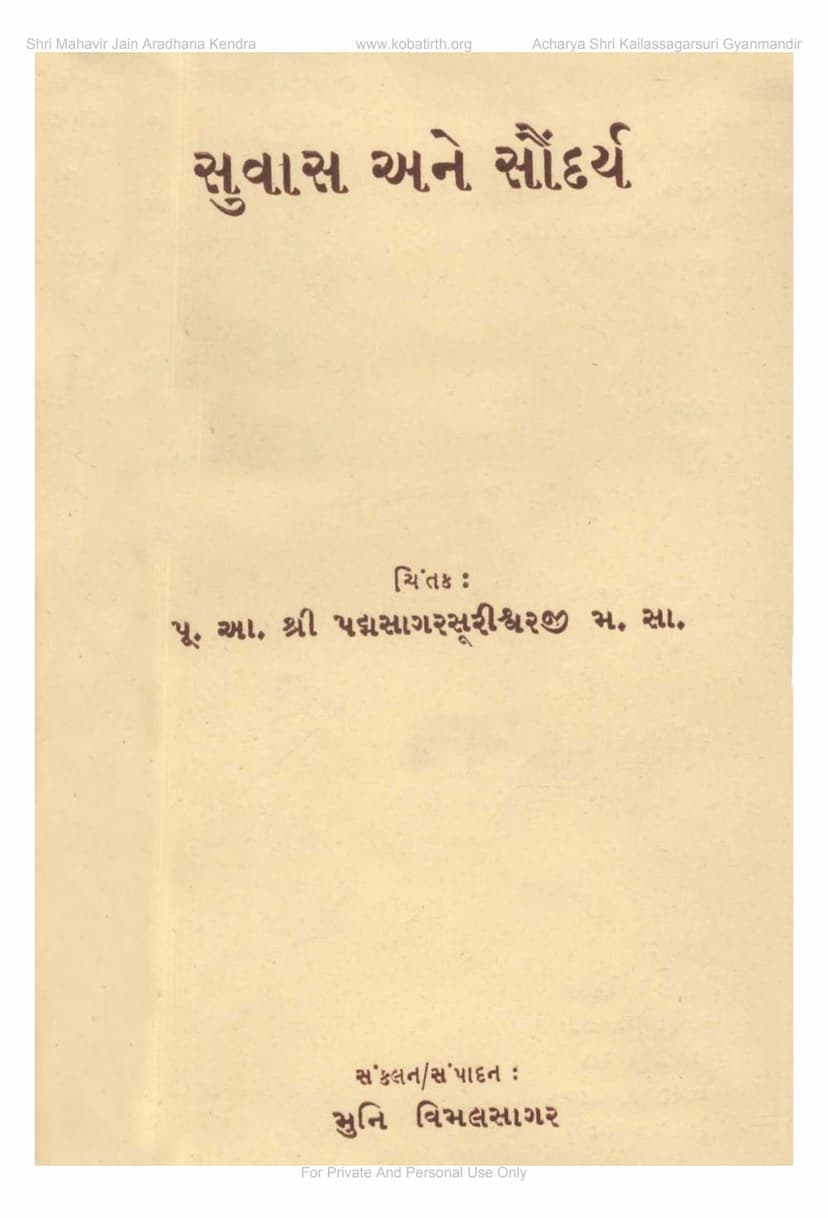Suvas Ane Saundarya
Added to library: September 2, 2025

Summary
Here's a comprehensive summary of the Jain text "Suvas ane Saundarya" by Acharya Shri Padmasagarsuri, based on the provided pages:
Book Title: Suvas ane Saundarya (Fragrance and Beauty) Author: Acharya Shri Padmasagarsuri Compiler/Editor: Muni Vimalsagar Publisher: Shri Mahavir Jain Aradhana Kendra, Koba, Gujarat
Overall Theme:
"Suvas ane Saundarya" is a collection of insightful sayings and teachings from Acharya Shri Padmasagarsuri, compiled by Muni Vimalsagar. The book aims to provide guidance and inspiration for a meaningful and spiritually rich life, emphasizing the core principles of Jainism. The title itself suggests a focus on the "fragrance" (positive qualities and actions) and "beauty" (inner purity and spiritual attainment) that a life dedicated to virtue and self-realization can cultivate.
Key Themes and Teachings:
The book is a compilation of aphorisms and short verses that cover a wide range of spiritual, ethical, and philosophical topics relevant to Jain philosophy. The central message revolves around:
- The Nature of Happiness and Desire: The book repeatedly stresses that true happiness is not found in material wealth or ever-increasing desires. It warns against the illusion that more money equals more happiness, as desires are boundless.
- Self-Reliance and Inner Strength: A significant theme is the idea that one's greatest friend and enemy is oneself. True victory lies in conquering one's inner vices and desires rather than external foes.
- The Importance of Righteous Action and Effort: The text emphasizes the value of righteous labor, small good deeds over grand intentions, and consistent effort. It states that destiny blossoms through acts of charity and that those who utilize their time wisely will be utilized by time itself.
- The Power of Forgiveness and Compassion: Forgiveness is highlighted as a powerful tool that can transform enemies into friends. Compassion and universal friendship are presented as fundamental aspects of dharma.
- The Essence of Dharma: Dharma is defined not by external sects or rituals but by inner purity, the control of desires (samyam), and the conquest of passions (tapasya). It is about guiding the soul from lower impulses towards righteous conduct.
- The Role of Knowledge and Wisdom: True knowledge is seen as a light that liberates from harm and helps discern right from wrong. It is meant for liberation, not just accumulation of wealth or degrees. Knowledge should lead to compassion, mercy, and detachment.
- Control of the Mind and Desires: The mind is a central focus, with emphasis on controlling its impulses, overcoming negative thoughts (lust, anger, greed, ego), and practicing introspection. The text suggests that true freedom comes from liberation from desires.
- The Value of Simplicity and Detachment: Reducing one's needs is presented as a path to happiness, and non-possession (aparigraha) is the companion of all happiness.
- The Importance of Character and Conduct: Righteous conduct (sadaachaar) makes a person truly human. Living in accordance with one's teachings is the mark of an excellent person. True character is demonstrated through actions, not just words.
- Detachment from Material Possessions: The book repeatedly states that wealth, power, and worldly possessions are temporary and ultimately left behind. True fulfillment comes from inner qualities and good deeds, which accompany one in the afterlife.
- The Nature of True Devotion: Devotion without inner feeling is considered mere ritual. True devotion involves a focused and unwavering heart, leading to spiritual attainment.
- The Path to Liberation (Moksha): The ultimate goal is liberation, which is achieved through controlling desires, practicing austerity, cultivating wisdom, achieving equanimity (samata), and realizing the true nature of the soul.
Specific Teachings Highlighted:
- Money vs. Happiness: "If you believe that as money increases, so does happiness, then that is your grave mistake."
- Self-Responsibility: "You have no enemy, and no one is your friend except yourself."
- Action over Ideation: "Doing a small good deed is better than making great intentions."
- Power of Forgiveness: "An enemy dies by the sword, but enmity does not die. However, through the medium of forgiveness, the enemy becomes a friend and his enmity ceases."
- True Victory: "Those who conquer the world are brave, but those who conquer their own vices are Mahavir (Greatly Brave)."
- Importance of Conduct: "Character is the best and most lasting fruit of our lives." "Knowledge without character leads to downfall."
- The Nature of True Wealth: "No one remembers a person's wealth, but everyone remembers their good deeds."
- The Antidote to Suffering: "Desire and greed are the roots of all suffering." "The fire of hope and desire will only create unrest in the mind."
- The Path to Peace: "If you want peace, be content."
In Essence:
"Suvas ane Saundarya" serves as a spiritual guide, offering profound insights into the Jain philosophy of living a life of virtue, self-control, and spiritual awareness. It encourages readers to cultivate inner beauty and fragrance through their actions, thoughts, and intentions, leading them towards true peace and liberation. The book's aphoristic style makes these profound teachings accessible and memorable, urging individuals to apply them in their daily lives.